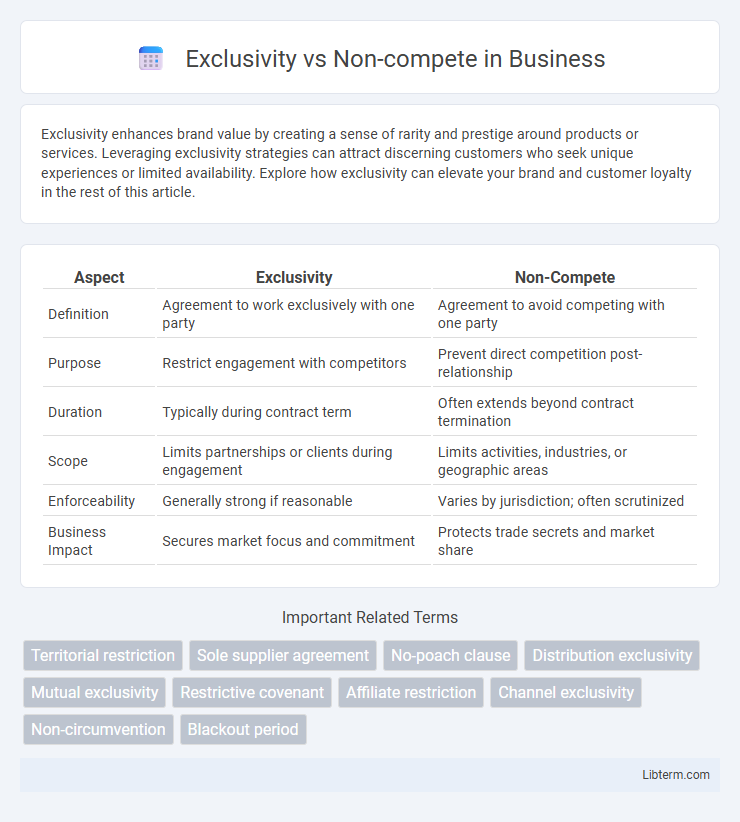Exclusivity enhances brand value by creating a sense of rarity and prestige around products or services. Leveraging exclusivity strategies can attract discerning customers who seek unique experiences or limited availability. Explore how exclusivity can elevate your brand and customer loyalty in the rest of this article.
Table of Comparison
| Aspect | Exclusivity | Non-Compete |
|---|---|---|
| Definition | Agreement to work exclusively with one party | Agreement to avoid competing with one party |
| Purpose | Restrict engagement with competitors | Prevent direct competition post-relationship |
| Duration | Typically during contract term | Often extends beyond contract termination |
| Scope | Limits partnerships or clients during engagement | Limits activities, industries, or geographic areas |
| Enforceability | Generally strong if reasonable | Varies by jurisdiction; often scrutinized |
| Business Impact | Secures market focus and commitment | Protects trade secrets and market share |
Understanding Exclusivity and Non-Compete Agreements
Exclusivity agreements require parties to engage solely with one business or partner, limiting collaboration to protect competitive interests, while non-compete agreements restrict individuals or companies from entering into competing activities during and after contract terms. Understanding the scope, duration, and geographical limits of exclusivity and non-compete clauses is essential for compliance and risk management. Legal enforceability varies by jurisdiction, making precise contract language and context critical for protecting business assets and maintaining fair competition.
Key Differences Between Exclusivity and Non-Compete Clauses
Exclusivity clauses require a party to work solely with one company or within a specific area, preventing simultaneous engagements with competitors, while non-compete clauses restrict a party from engaging in competitive activities or businesses entirely for a defined period and geographic scope. Exclusivity primarily governs ongoing commitments during the contract term, whereas non-compete clauses impose limitations even after the contract's termination. The key differences lie in their scope, duration, and enforcement, with exclusivity focusing on exclusive service provision and non-competes aiming to protect competitive interests from future threats.
Legal Foundations of Exclusivity vs Non-Compete
Exclusivity agreements create a contractual obligation for a party to deal solely with one business, founded on principles of contract law and enforceable through breach of contract claims. Non-compete clauses restrict a party's ability to enter competing markets or employment, grounded in restraint of trade doctrines and subject to strict scrutiny to ensure reasonableness in scope, duration, and geographic area. Courts balance protecting legitimate business interests with preventing undue hardship or anti-competitive effects when enforcing both exclusivity and non-compete agreements.
Pros and Cons of Exclusivity Agreements
Exclusivity agreements offer businesses the advantage of dedicated partnerships that can lead to increased trust, better resource allocation, and improved product or service quality by preventing partners from engaging with competitors. However, these agreements may limit flexibility, restrict market opportunities, and potentially cause dependency on a single partner, which could be detrimental if the partner underperforms or the market shifts. Balancing exclusivity involves assessing the strategic value of commitment against the risks of reduced competition and innovation.
Pros and Cons of Non-Compete Agreements
Non-compete agreements restrict employees from joining competing businesses within a specific geographic area and time frame, protecting company trade secrets and reducing talent poaching. However, these agreements can limit worker mobility, reduce opportunities for career growth, and potentially lead to legal disputes due to enforceability issues. Balancing the protection of business interests with employee rights is crucial when implementing non-compete clauses to avoid negative impacts on recruitment and retention.
Industry Applications: When Exclusivity or Non-Compete is Preferred
Exclusivity agreements are preferred in industries like manufacturing and retail where maintaining supplier or distributor loyalty is critical to securing market share and controlling product distribution. Non-compete clauses are more common in technology and service sectors to protect intellectual property and prevent employees or partners from directly competing after contract termination. Choosing exclusivity or non-compete depends on the specific industry's competitive dynamics and the nature of business relationships to safeguard strategic interests effectively.
Global Variations in Enforcing Exclusivity and Non-Compete
Global variations in enforcing exclusivity and non-compete agreements reflect differing legal frameworks and labor market priorities, with jurisdictions like the United States often upholding non-compete clauses strictly, while countries such as Germany and France impose significant restrictions to protect employee mobility. Asian nations present a mixed landscape: Japan enforces exclusivity agreements moderately, whereas China tends to limit non-compete enforceability to narrowly defined post-employment periods and reasonable compensation. Understanding these regional differences is crucial for multinational corporations to ensure compliance and mitigate legal risks in drafting exclusivity and non-compete contracts.
Common Challenges and Legal Disputes
Exclusivity and non-compete agreements often face legal disputes due to vague terms and overbroad restrictions that limit an individual's future employment opportunities, posing challenges in enforceability. Courts frequently scrutinize the reasonableness of geographic scope, duration, and the necessity to protect legitimate business interests, leading to inconsistent rulings. Employers and employees commonly struggle with balancing protection of trade secrets and fair labor mobility, resulting in costly litigation and negotiation complexities.
Negotiating Fair Terms in Agreements
Negotiating fair terms in exclusivity and non-compete agreements requires clear definitions of scope, duration, and geographical limits to avoid overly restrictive clauses that hinder career growth and business opportunities. Ensuring mutual benefits, parties should balance protection of proprietary interests with reasonable allowances for future work, preventing unfair market monopolization. Including exit clauses and periodic reviews in agreements enhances flexibility and fairness, fostering long-term collaboration and trust.
Future Trends in Exclusivity and Non-Compete Practices
Future trends in exclusivity and non-compete practices reveal a shift towards more tailored and limited agreements, emphasizing flexibility to accommodate evolving workforce dynamics and remote work arrangements. Legal scrutiny is increasing, prompting companies to prioritize enforceability and fairness while balancing protection of trade secrets and employee mobility. Emerging regulations and judicial rulings trend towards restricting broad non-compete clauses, encouraging alternative protective measures such as confidentiality agreements and targeted exclusivity provisions.
Exclusivity Infographic

 libterm.com
libterm.com